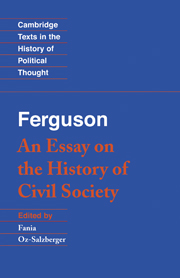Book contents
- Frontmatter
- Contents
- Introduction
- Chronology of Ferguson's life
- Biographical notes
- Bibliographical guide
- A note on the text
- Acknowledgements
- An Essay on the History of Civil Society
- Contents
- PART I Of the General Characteristics of Human Nature
- PART II Of the History of Rude Nations
- PART III Of the History of Policy and Arts
- PART IV Of Consequences that result from the Advancement of Civil and Commercial arts
- PART V Of the Decline of Nations
- PART VI Of Corruption and Political Slavery
- List of variants
- Index
- Title in the series
PART I - Of the General Characteristics of Human Nature
Published online by Cambridge University Press: 05 June 2012
- Frontmatter
- Contents
- Introduction
- Chronology of Ferguson's life
- Biographical notes
- Bibliographical guide
- A note on the text
- Acknowledgements
- An Essay on the History of Civil Society
- Contents
- PART I Of the General Characteristics of Human Nature
- PART II Of the History of Rude Nations
- PART III Of the History of Policy and Arts
- PART IV Of Consequences that result from the Advancement of Civil and Commercial arts
- PART V Of the Decline of Nations
- PART VI Of Corruption and Political Slavery
- List of variants
- Index
- Title in the series
Summary
Of the question relating to the State of Nature
Natural productions are generally formed by degrees. Vegetables grow from a tender shoot, and animals from an infant state. The latter being destined to act, extend their operations as their powers increase: they exhibit a progress in what they perform, as well as in the faculties they acquire. This progress in the case of man is continued to a greater extent than in that of any other animal. Not only the individual advances from infancy to manhood, but the species itself from rudeness to civilization. Hence the supposed departure of mankind from the state of their nature; hence our conjectures and different opinions of what man must have been in the first age of his being. The poet, the historian, and the moralist, frequently allude to this ancient time; and under the emblems of gold, or of iron, represent a condition, and a manner of life, from which mankind have either degenerated, or on which they have greatly improved. On either supposition, the first state of our nature must have borne no resemblance to what men have exhibited in any subsequent period; historical monuments, even of the earliest date, are to be considered as novelties; and the most common establishments of human society are to be classed among the incroachments which fraud, oppression, or a busy invention, have made upon the reign of nature, by which the chief of our grievances or blessings were equally with-held.
- Type
- Chapter
- Information
- Ferguson: An Essay on the History of Civil Society , pp. 7 - 73Publisher: Cambridge University PressPrint publication year: 1996
- 1
- Cited by

